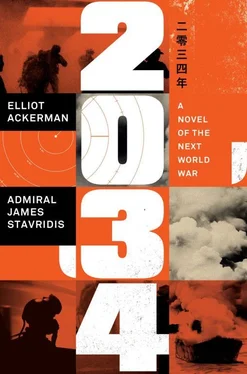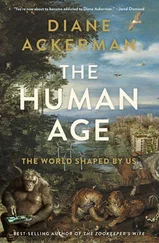An inferno of smoke and flames obscured and consumed the carrier.
Patel paged quickly through the pictures that followed as if each were an image in a flip-book, animating the burning carrier as it slipped beneath the waves. When his uncle came to the last photograph, which was of the calm and consuming sea again at rest, he put words to what Chowdhury had witnessed. “These are periscope photographs from one of our upgraded Kalvari-class diesel-electric submarines. Their modified propulsion system affords them an essentially unlimited range, equal to any of your nuclear submarines. We’ve used one to sink the Zheng He .”
As his uncle had promised, Chowdhury was perplexed. “You sunk the Zheng He … but you are not allying yourself with the United States?”
“Correct,” said Patel. “Our interests are to de-escalate this conflict. If your government takes any retaliatory action for Galveston or San Diego, it won’t be a Chinese ship that we sink next but an American one.” Patel presented his nephew with another image, a map that showed the approximate disposition of Indian naval forces in and around the South China Sea. “And as you’ll see, this isn’t a hollow threat.”
Patel’s map seemed an impossibility to Chowdhury. If accurate, it meant that dozens of Indian warships had infiltrated into the South China Sea undetected, representing a gross underestimation of India’s stealth-cloaking and cyber capability by his own country. Chowdhury’s thoughts shifted to a couple of days before, how his uncle had learned of the Enterprise ’s receipt of launch orders against the Chinese mainland. He was increasingly certain that Patel knew this through Chowdhury’s email exchange with Hendrickson. If the Indians possessed enough sophistication to hack into a state-of-the-art encrypted email system, was it not also likely that they possessed the sophistication to position their fleet clandestinely between the Enterprise and the Chinese mainland?
“Our defense attaché visited the White House and showed these pictures to your national security advisor….”
“And?” Chowdhury asked his uncle.
“He was thanked and escorted out of the building.”
Chowdhury nodded.
“It is my belief that your Mr. Wisecarver never passed along these materials or news of our attaché’s visit to anyone else in the administration. It is also my belief that your Mr. Wisecarver has no intention of expressing the nuance of our government’s position to your president.”
“Your beliefs are likely correct,” answered Chowdhury. “So why are you telling me this?”
They’d finished their tea. Patel gave his nephew a glance, then went back to the register where the cashier sat. She poured him another two cups, but this time Patel neglected to drop a coin in her jar. Patel returned to his seat, picking up their conversation. “I am telling you all of this because perhaps there is another way to convey our message.” He handed Chowdhury his tea and fixed him in his stare, as if he were waiting for his nephew to speak. However, Chowdhury wouldn’t say anything. By conspiring with his uncle in this way, he felt as though he were skirting a treasonous line. And so, Patel finished the thought for him: “Your friend Hendrickson might be able to communicate our message directly.”
“Going around Wisecarver to the president would likely end his career.”
“If the Enterprise launches a counterstrike,” Patel answered gravely, “much more will end than the career of one man.”
The two of them sat quietly. “Why are we meeting here, in this canteen?” asked Chowdhury. “Why not in a secure conference room?” He glanced at the cashier, who was nominally paging through a gossip magazine but who he suspected had been listening to them this entire time.
“Because we haven’t had a meeting,” answered Patel. “None of this is official. My government hasn’t sanctioned my talking to you. As far as they’re concerned, we’re discussing my sister’s health.” For the first time, Chowdhury felt uncertain who exactly his uncle spoke for. As if he could sense his nephew’s unease, Patel added, “To break certain impasses, sometimes we have to rely on a bond stronger than nationality. Sometimes the only bond that is strong enough is family.” Patel clasped his nephew by the shoulder. “You will talk to your friend Hendrickson?”
Chowdhury nodded.
“Good,” he said. “I’m late to a meeting. Can you find your way out?”
He nodded. “Yes.”
“And don’t worry about her,” Patel added as he got up. “She’s near deaf… a tragic story.” On his way out, he glanced once more at the cashier. With that, his uncle was gone.
Chowdhury sipped slowly from his half-finished cup of tea, puzzling over how to outmaneuver Wisecarver. He likely had only hours until the Enterprise launched its counterstrike against the Chinese mainland. He had no idea what the Indian response might be. Or how his government might react. The task his uncle had placed before him seemed an impossible one. He must’ve appeared in pretty bad shape as he stood from his seat. He could feel the old widow at the cash register staring at him piteously. As Chowdhury passed by her, he reached into his pocket and took out some change, dropping it into her jar.
She took his hand by the wrist, startling him. Her eyes were wide and watery with what seemed like nostalgia. “Thank you,” she said. “Thank you.”
Chowdhury glanced down at her grip. “Think nothing of it.”
For another long moment, she wouldn’t let him go.

17:49 July 29, 2034 (GMT+4:30)
Strait of Hormuz
He had been walking in circles. At least that’s what it felt like to Farshad. Day and night. Ever since he’d arrived on Hormuz Island. Going in one big circle. He would check a fighting position—say, an antiaircraft gun—then proceed to the next—say, a machine gun oriented on the beaches—then one of the new directed-energy cannons, which never seemed to work. On and on he’d go, viciously kicking stones out of his path as he followed the few miles of perimeter, his only break being the brief boat ride between this island and its twin, Larak Island, where he walked a nearly identical circle.
The defenses on the islands were paltry at best: a handful of antiaircraft guns, a few hundred poorly trained conscripts, some barbed-wire obstacles. That was about it. Did General Bagheri really expect him to defend these strategically critical islands with this? He couldn’t be serious. And in fact, General Bagheri wasn’t serious—or at least he didn’t take the threat of a Russian invasion seriously. When Farshad had presented this prospect on his return from New Delhi, General Bagheri had sat behind his desk, plucking pistachios from a dish, knuckling open their shells while he listened patiently. Then with indifference he’d asked, “Is that all?”
What had followed was the greatest dressing-down Farshad had received in at least a decade. According to General Bagheri, the idea of a Russian invasion of the Hormuz Strait Islands was preposterous. Tehran and Moscow had been allied for decades. Furthermore, the information had come from the Indians, who were no great friends of either nation. Then, turning personal, Bagheri had said, “Lieutenant Commander Farshad” (annunciating his full rank as if to remind him how far he had fallen), “I placed you in the Navy so that you wouldn’t cause more problems. But now, the Supreme Leader has himself read your warning of a Russian strike. Against my advice, he’s chosen to release the Indian tanker and he has also ordered me to reinforce our islands in the strait. It seems I’ve been unsuccessful in keeping you out of trouble.”
Читать дальше













